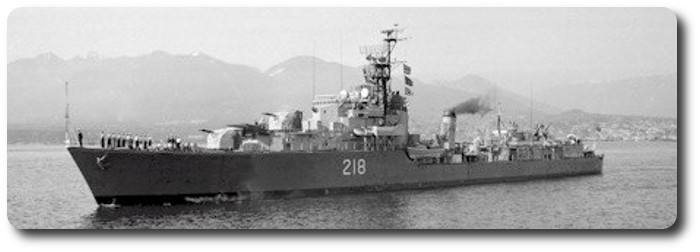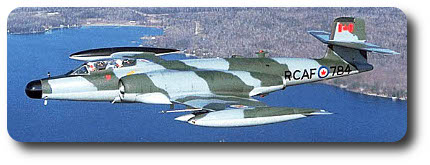Topic: Canadian Armed Forces

A-Secrecy Gives Canadian Fliers and Sailors Outmoded Weapons for Defending U.S. Cities
Toledo Blade, Toledo, Ohio, 13 July 1958
By Gerard Waring
Ottawa—One of the matters that President Eisenhower and Prime Minister Deifenbaker discussed here this week was the position of Canada in light of the changes in American law which makes American military atomic science available to Great Britain.
The necessary qualification for receiving U.S. atomic aid is the prior development of atomic weapons by the nation which is to receive the aid. Britain is the only western nation that so qualifies.
For several years Canada has had the financial, scientific and fissile materials resources to produce atomic bombs. But the Canadian government has refrained from entering the atomic arms race and instead has concentrated its not inconsiderable atomic research faciloities on the development of peaceful uses of atomic energy.
,em>But—
Canada now needs atomic weapons, in the form of warheads for ground-to-air and air-to-air missiles rather than bombs, to defend Canada and to help defend the United States in case Russia attacks.

 The entire Canadian air defence potential, excluding only a division of jet interceptors stations in Europe, is in process of being put under the operational control of the North American Air Defence Command at Colorado Springs, along with USAF jets.
The entire Canadian air defence potential, excluding only a division of jet interceptors stations in Europe, is in process of being put under the operational control of the North American Air Defence Command at Colorado Springs, along with USAF jets.
The USAF jets are being armed with missiles equipped with atomic warheads. The RCAF's present CF-100 jet interceptors are armed only with rockets and cannon. Plans are to equip Canada's new supersonic jet, the CF-105, with Sparrow missiles developed by the U.S. Navy, but under present circumstances stemming from U.S. law, these missiles will have high explosive, rather than atomic warheads.
The Royal Canadian Navy is faced with a similar handicap. It is an anti-submarine fleet. Its job is to ferret out and sink enemy subs. The evidence is now overwhelming that the best defence against a nuclear sub is another nuclear sub. The Canadian navy is planning to acquire N-subs. But because of the restriction imposed on the U.S. navy by the McMahon Act, the Canadian navy cannot obtain from the U.S. Navy all the information it would like on the design of nuclear submarines. So Canada is working, with British help, on the development of its own atomic subs, needlessly duplicating research the U.S. already has done.
This situation, and the RCAF's lack of atomic warheads, weakens continental defence.
Obviously the new U.S. law was drafted so it would apply to Britain but not to France. For the sake of a roadblock in the way of France becoming the world's fourth atomic power, Canadian fliers may have to defend Chicago and Detroit with outmoded arms, and Canadian sailors to defend Boston and new York with outmoded ships.
The situation becomes more ridiculous in light of two additional facts:
Canada is the chief supplier of fissile materials for the American atomic arms program. Without the production of Canadian mines, the U.S. would be in a much less favorable position in the atoic race with Russia.
There has always been very free exchange of information and personnel between British and Canadian atomic projects, and between British and Canadian armed forces.

But the problem before President Eisenhower here this week was, how could he justify a "yes" to prime Minister Deifenbaker, and a "no" to General De Gaulle? How can the U.S. accept in atomic partnership an ally which has made no effort to develop atomic arms, and refuse such partnership to the French ally, which is very eager to produce its own atomic weapons and become the fourth member, with the U.S., Britain and Russia, of the "atomic club"? It is a dilemma that may not be resolved until France fires its own home-made A-bomb.

